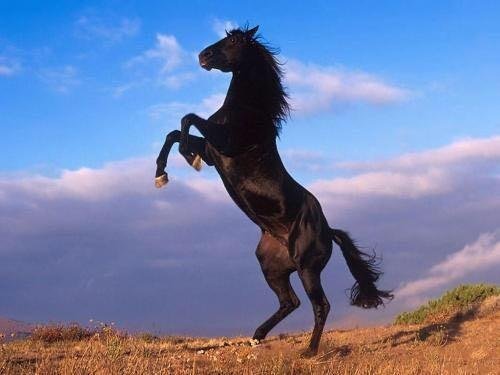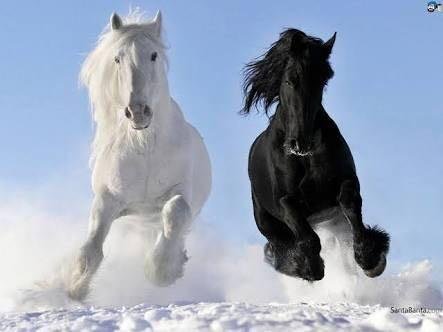Horses Never Forget Human Friends
Horses Never Forget Human Friends 
 bold****bold****bold****bold
bold****bold****bold****bold
A scientific study reported by Discovery News verifies that horses are closer to people who treat them well, and the study praises the use of treats and words. Those who have read The Soul of a Horse and Born Wild will understand why that gets a big Yippee! from me, and I’m sure from trick trainer Allen Pogue as well. A full chapter in Soul (The Big Red Circus Ball) is devoted to these subjects. We have known for some time that the findings regarding treats and words are true but so many preach “Never use treats” and even “Don’t talk to your horse” that’s it’s really nice to hear what you believe and know to be true verified in a scientific study. I can’t wait to tell our horses about it :)
The study strongly verifies that horses are not only closer to people who treat them well, they are more willing, and remember those people positively forever. Even after long separations. Yes! Trust and Relationship first!
The text of the article follows. It’s a good read and super reinforcement for those of us who knew it all along but grow tired of the hammering from naysayers.
Horses not only remember people who have treated them well, they also understand words better than expected, research shows.
By Jennifer Viegas
Human friends may come and go, but a horse could be one of your most loyal, long-term buddies if you treat it right, suggests this scientific study.
Horses also understand words better than expected, according to the research, and possess “excellent memories,” allowing horses to not only recall their human friends after periods of separation, but also to remember complex, problem solving strategies for ten years or more.
The bond with humans likely is an extension of horse behavior in the wild, since horses value their own horse relatives and friends, and are also open to new, non-threatening acquaintances.
“Horses maintain long-term bonds with several members of their family group, but they also interact temporarily with members of other groups when forming herds,” explained Carol Sankey, who led the research, and her team.
“Equid social relationships are long-lasting and, in some cases, lifelong,” added the scientists, whose paper has been accepted for publication in the journal Animal Behavior.
Ethologist Sankey of the University of Rennes and her colleagues studied 20 Anglo-Arabian and three French Saddlebred horses stabled in Chamberet, France. The scientists tested how well the horses remembered a female trainer and her instructions after she and the horses had been separated up to eight months.
The training program for the horses consisted of 41 steps associated with basic grooming and medical care. For example, the horses had to remain immobile in response to the verbal command “reste!” which is French for “stay.” The horses also had to lift their feet, tolerate a thermometer inserted into the rectum and more. When a horse did as it was instructed, the trainer rewarded it with food pellets.
With tasty rewards, the horses “displayed more ‘positive’ behaviors toward the experimenter, such as sniffing and licking,” the researchers wrote. Horses do this as a sign of affiliation with each other, so they weren’t necessarily just seeking more food.
The scientists added, “Horses trained without reinforcement expressed four to six times more ‘negative’ behaviors, such as biting, kicking and ‘falling down’ on the experimenter.”
Nevertheless, after the eight months of separation, the horses trained with food rewards gravitated towards the same experimenter. The horses also seemed to accept new people more readily, indicating they had developed a “positive memory of humans” in general.
“From our results, it appears that horses are no different than humans (in terms of positive reinforcement teachings),” according to the researchers. “They behave, learn and memorize better when learning is associated with a positive situation.”
While people often train dogs in this way, also using verbal commands, Sankey and her team point out that “the majority of horseriding training is based on tactile sensations — pressure from bits, movements of riders’ legs, weight change in the saddle.”
Since “horses are able to learn and memorize human words” and can hear the human voice better than even dogs can, due to their particular range of hearing, the scientists predict trainers could have success if they incorporate more vocal commands into their horse training programs.
Jill Starr is president and founder of Lifesavers Wild Horse Rescue, a non-profit that provides refuge, training and adoption placement for otherwise slaughter-bound wild mustangs and domestic horses. Starr told Discovery News that she’s observed horses responding well to verbal commands… and agrees that horses are loyal, intelligent and have very long-lasting memories — of both good and bad experiences.
Starr said, “Horses can be very forgiving, but they never forget.”
Back to me. Our wondrous herd of eight all prove these findings every day of their lives. – Joe
——
The story of our journey with horses (to date) is told in the two books that follow: the national best seller The Soul of a Horse – Life Lessons from the Herd and its sequel Born Wild – The Soul of a Horse.
And what a story it is as two novices without a clue stumble and bumble their way through the learning process so that hopefully you won’t have to. If you haven’t read both of these books already please do because with that reading, I believe, will come not just the knowledge of discovery but the passion and the excitement to cause you to commit to your journey with horses, to do for the horse without waiver so that your relationship and experience will be with loving, happy and healthy horses who are willing partners and who never stop trying for you. Horses like ours.
https://thesoulofahorse.com/blog/horses-never-forget-human-friends/